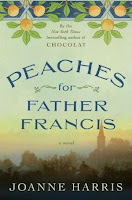Peaches for Father Francis by Joanne Harris
Published: October 2012 by Penguin Group
Source: my copy courtesy of the publisher in exchange for this review
Publisher's Synopsis:
When Vianne Rocher receives a letter from beyond the grave, she has no choice but to follow the wind that blows her back to Lansquenet, the beautiful French village in which eight years ago she opened a chocolate shop and first learned the meaning of home. But returning to one’s past can be a dangerous pursuit. Vianne, with her daughters, Anouk and Rosette, finds Lansquenet changed in unexpected ways: women veiled in black, the scent of spices and peppermint tea—and there, on the bank of the river Tannes, facing the church, a minaret. Most surprising of all, her old nemesis, Father Francis Reynaud, desperately needs her help.
My thoughts:
I have loved Vianne Rocher since I first met her in the movie version of Harris' Chocolat so I was delighted to see that Harris had not only written another chapter in her life but also that Vianne and her family would be returning to Lansquenet where readers first met her. In Peaches for Father Francis Vianne's magic is less present, her doubts more obvious, and Harris' lesson a little less subtle.
This time Vianne, who is now living in Paris with her family, receives a letter from her friend, Armande, forwarded to her by Armande's grandson, Luc. Vianne is surprised to find that, in a letter written before she died, Armande has asked Vianne to return to Lasquenet, predicting from the past the precise moment when the village will be in need of Vianne's particular kind of magic. A community of Muslims has settled in an area of Lansquenet which had long ago been abandoned. For many years the Catholic natives and the Muslim immigrants have lived together with very few problems. When a new man moves to town attitudes begin to change and when his sister, Ines Bencharki follows him to town, prejudices and hatred rear their ugly heads.
Harris spends a lot of this book focused on Father Francis Reynaud, Vianne's nemesis in Chocolat and the moral compass of the village. In fact, Harris uses dual narration with both Vianne and Reynaud moving the story forward. In addition to the conflict between the two factions of the village, both Vianne and Reynaud are wrestling with their own issues. Vianne has cause to doubt her relationship with Roux and Reynaud is struggling with changes in the church and his place in it. This was actually a problem for me as I struggled to determine which character was the focus of the book. Father Francis is, after all, the character in the title. But these are Vianne's stories. And then there is the mystery of Ines Bencharki.
It felt like a Harris tried to do too much in this one and I wondered if Harris felt that she had done as much as she could other than bring Vianne "home." Yet the book ends with a question as to whether or not Vianne and her family will stay together and whether or not they will stay in Lansquenet or return to Paris. It's clear that Harris intends to write another book in this series. I suppose if I think of this as a book that puts Vianne in position for her next story and also happens to tell the story of Ines Bencharki versus Father Francis, then that works for me. Oh heck, who am I kidding? I liked this book regardless of its flaws. I can vividly picture the village, the characters who inhabit it and I was happy to spend time with Vianne again. It just wasn't my favorite.


No comments:
Post a Comment